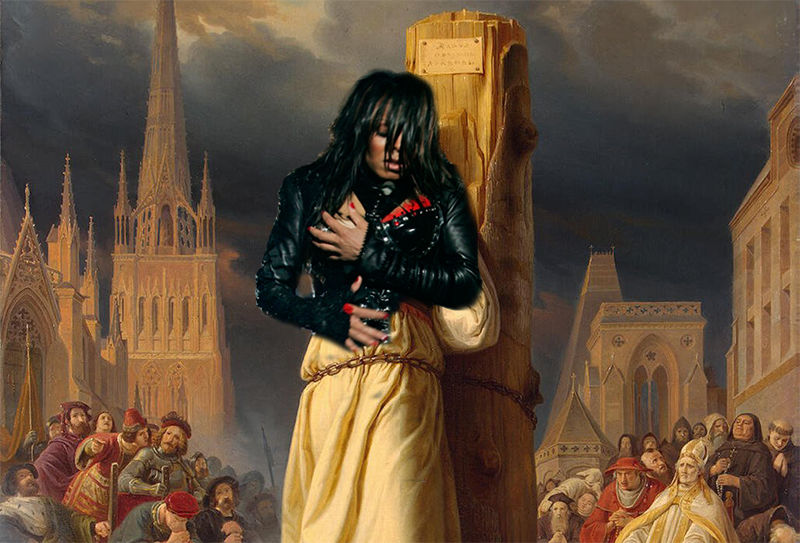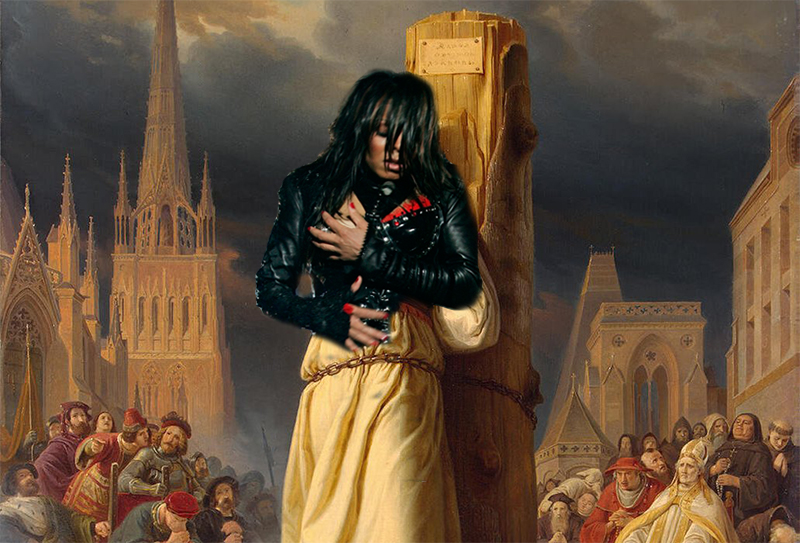Fast forward 11 years, and it was Janet's turn to carry on the family legacy of slaying at America's most popular sporting event. She pretty much did that -- although we forget -- with live renditions of hits like “Rhythm Nation” and “All for You.” Then Justin Timberlake joined her on stage for a duet version of his single, “Rock Your Body." At the point in the song when he sings, "Better have you naked by the end of this song,” he was supposed to pull Janet's bustier to reveal a red lace bra, but both pieces ended up ripping off.
Then everyone got insanely mad at Justin for messing up. Oh, wait, sorry, I forgot about the patriarchy for a second. Let me try that again: then everyone got insanely mad at Janet for having breasts and no one ever really mentioned Justin again. For example, The Washington Post’s Tony Kornheiser wrote, "What Janet Jackson did was bizarre, deliberately flopping out of her costume like that." Justin's grabbing hand is entirely erased from the scene.
The senseless sexism didn't end there. Janet was disinvited from that year’s Grammys. Meanwhile, Justin was not only allowed to attend, but also performed. Janet was blacklisted from radio and music video channels for the next several years, leading to multiple album flops, while Justin got to be goofy on SNL and become a movie star.
Justin had this to say about getting off scot free, thanks to his white male privilege: “I probably got 10% of the blame, and that says something about society. I think that America’s harsher on women. And I think that America is, you know, unfairly harsh on ethnic people.”
That last point brings up the fact that Janet’s first crime was being a woman and the second that she was a black woman.
In a 2009 study, Shannon L. Holland of Clemson University suggested the vilification of Jackson in the media followed the tradition of "the Jezebel" stereotype. For those of you who aren’t as woke as you’d like to be, the term refers to depictions of black women as lustful, promiscuous, insatiable and immoral, a characterization that was used by white slave owners to justify forcing female slaves to procreate and as a legal defense when raping these women.
We like to think we’re far removed from America's dark past, as if printing (some of) the facts into textbooks absolved us and negated the impact of all of that history, but situations like the treatment of Janet after the Halftime Show prove that the struggle for civil rights for women and people of color is an ongoing negotiation. The oppression is still all around us; it has simply evolved and learned how to camouflage.
The anti-Janet uproar wasn't just confined to talk shows, radio stations and op-eds, thanks to the efforts of Michael Powell, who was the chairman of the FCC at the time. He called the incident a “classless, crass and deplorable stunt” and effectively waged a culture war, which resulted in fining CBS $550,000, policing TV for "immoral" content, and implementing a five-second delay for all future live televised performances. The fine per indecency violation was raised from $27,500 to $325,000. All nine American network soap operas eliminated sexual storylines, ER re-edited an episode that featured some of an injured elderly woman's breast and the Victoria's Secret Fashion Show was scrapped. It even got so bad that 65 ABC stations decided not to air Saving Private Ryan out of fear that the government would fine them for profanity within the script. Years later, Powell would say: "I think we've been removed from this long enough for me to tell you that I had to put my best version of outrage on that I could put on. Part of it was surreal, right?" Right.
Many people believed this witch hunt was a way to influence the election (spoiler: the conservatives won on a platform of “moral values” later that year) and distract the nation from the failing war in Iraq. Janet agreed: "There are much worse things in the world, and for this to be such a focus, I don't understand. They needed something to focus on instead of the war, and I was the perfect vehicle for that."
A familial connection that brings Janet's concern into sharp focus: FCC head Michael Powell's father is none other than Colin Powell, George W. Bush's Secretary of State and one of the instrumental figures involved in selling the idea of the Iraq War. Things that make you go hmmm.
Thankfully, there were some voices that brought a bit of reason to the debate. The New York Times' Frank Rich wrote: “Let us be grateful that Janet Jackson didn’t bare both her breasts” and called the cultural climate “a wave of self-censorship on American television unrivaled since the McCarthy era.” And Robert Thompson, a professor at Syracuse, wrote: “Which do you think harmed children more: one second of a woman’s breast or 14 minutes of commercials showing how beer will transform your life into a magical, beautiful party? Or the multiple commercials on erectile dysfunction. I think the only children who got hurt were the children of the people who got fired.”
And this just scratches the surface. What about this double standard: showcasing breasts in Budweiser or Hooters commercials is deemed acceptable television because, in those contexts, the female anatomy exists solely for the pleasure and benefit of men. Step outside of that framework into any reality where the woman might be in charge of her sexuality or *gasp* enjoy herself and there will be a problem.
Over a decade later, Janet is just starting to recover. Her last album, Unbreakable, debuted at #1 on the Billboard charts and both the record and her world tour have been well received by critics. But she'll most likely have to work against the damage done by that 9/16th of a second for the rest of her career, a tiny momentary blip that contains projections of some of the ugliest facets of America. And for this, we owe Janet Jackson a huge apology.
This piece was inspired by an episode of The Cooler, KQED’s weekly pop culture podcast. Give it a listen!



